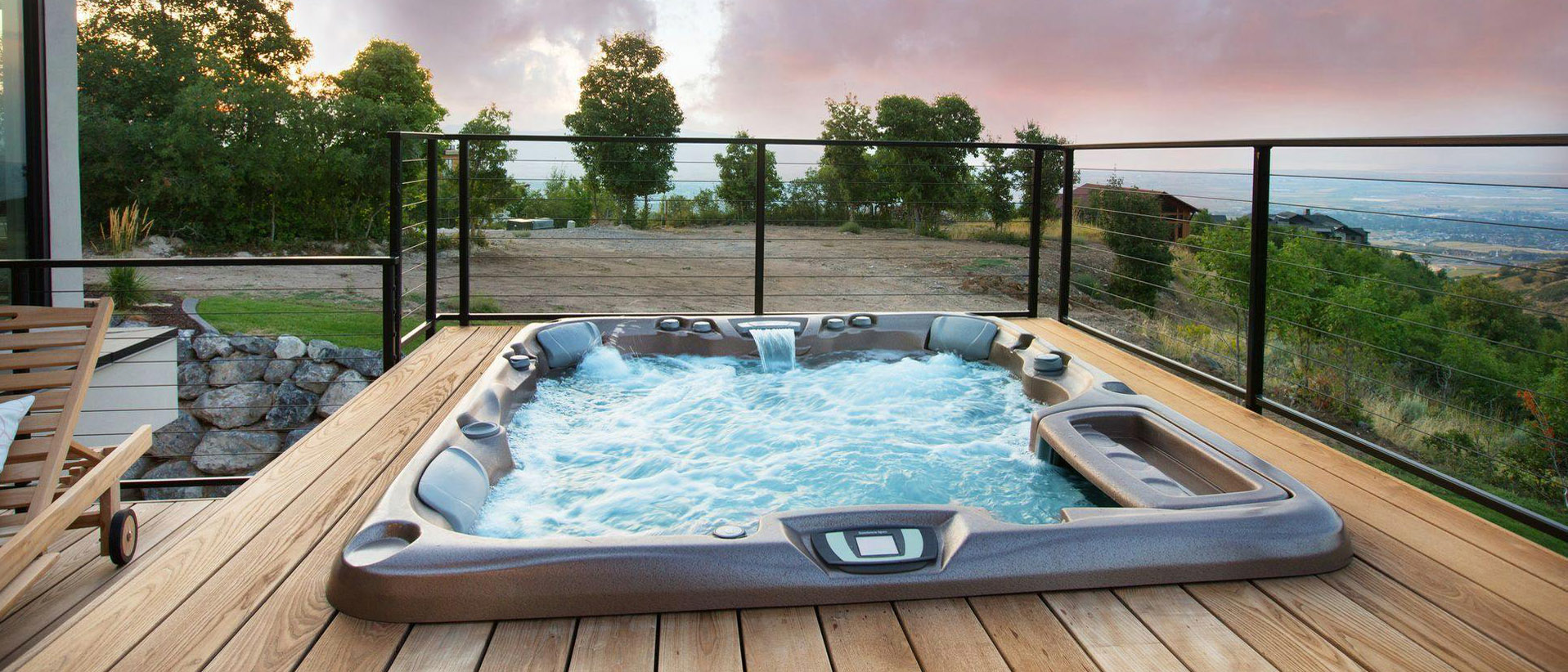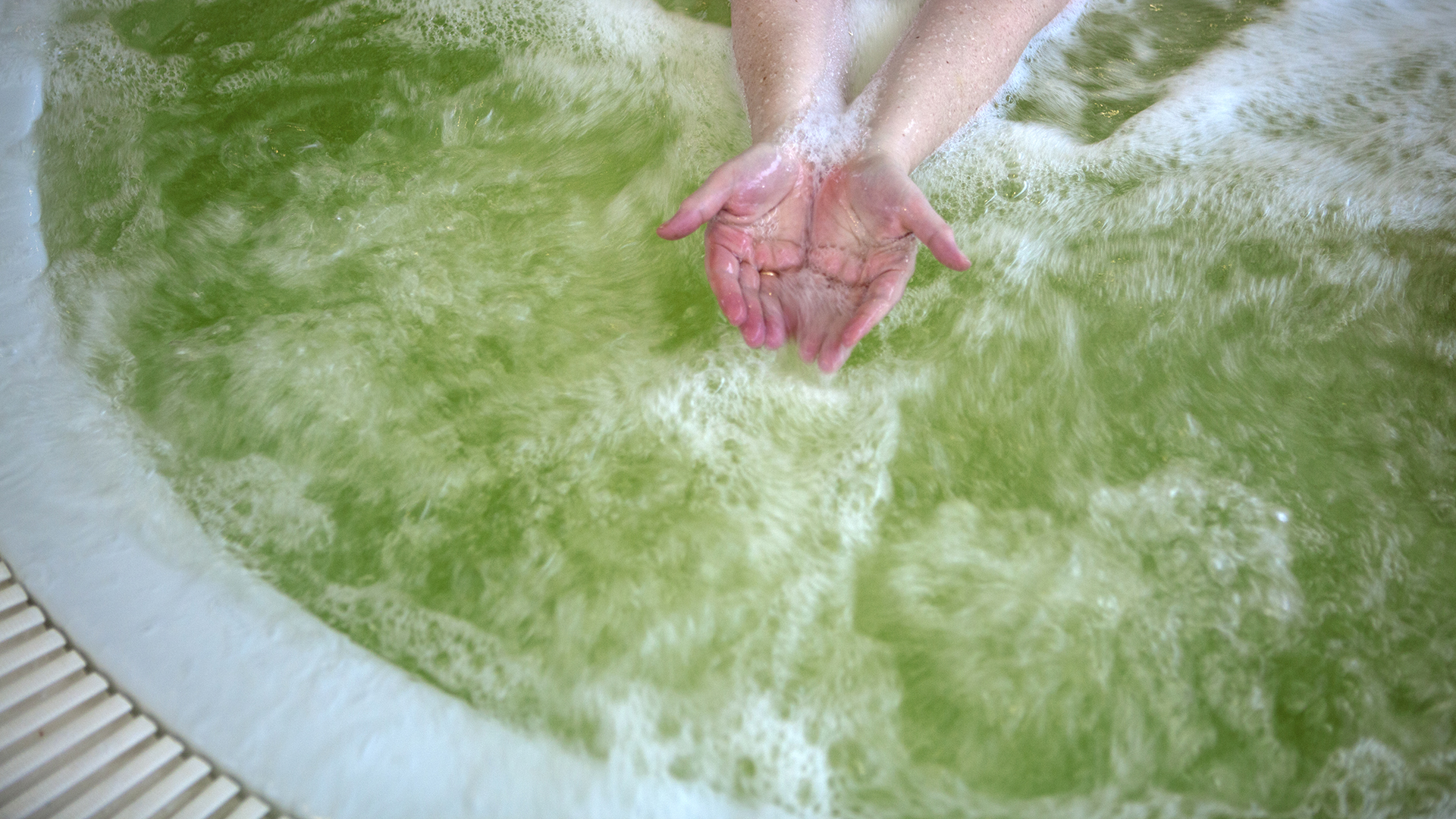Green water in your hot tub is a sure sign that your chemical levels need some tweaking. It will look and probably smell unpleasant, and it prevents you from enjoying your hot tub safely.
Laurence Hookway explains the common reason for green water in hot tubs, “When your hot tub water turns green, it is usually the result of algae growing in the water, but it can also be related to oxidizing minerals such as iron and copper. However, more often than not, algae is the main culprit.
Hot tubs may seem like the perfect way to relax in your backyard, but there needs to be a regular weekly and monthly chemical regime to keep your water clean and clear.
This guide explains why green water in your hot tub happens and what you can do to fix the problem. We’ve also got tips from an industry expert on maintaining your hot tub water so that it doesn’t go green again.
If you’re considering upgrading your existing hot tub or taking the plunge for the first time, you’ll find plenty of choices in our buying guide to the best hot tubs, from great entry-level tubs to luxury models.
Laurence Hookway, Sales Manager at Aqua Spa and Leisure, gives his top tip for avoiding green water in your hot tub: “Use a weekly shock dose of chlorine or non-chlorine shock in your hot tub to reduce bacteria and other impurities. At Aqua Spa, we use non-chlorine shock. It’s a powerful oxidizing agent that removes contaminants and bacteria from the water. It also helps your regular sanitizer to work more efficiently.”
Why is there green water in your hot tub?
Green water in your hot tub may be down for a number of reasons, but the most likely cause, says Laurence, is algae growth. “Once algae get in, bacteria will form and grow, resulting in green water. Excessive exposure of poorly sanitized water to sunshine will also speed up the growth of bacteria.”

Laurence Hookway manages Aqua Spa and Leisure, which sells hot tubs, hot tub accessories, and hot tub chemicals. Laurence joined Aqua Spa in 2020 and has a wealth of knowledge on how to care for and maintain your hot tub so that you can enjoy it year-round.
Although Hookway concedes that covering your tub when it’s not in use provides some protection, even a well-sealed hot tub with a cover can be vulnerable to algae, and when sanitizer levels run low in the water, it’s even more at risk.
When it comes to choosing a sanitizer for your hot tub, Hookway recommends bromine. “Bromine is widely considered a more effective sanitizer than chlorine for hot tubs, as it has a higher efficacy rate across a wider range of pH levels.”
Whether you use chlorine or bromine, regularly check your sanitizer levels by dipping a sanitizer test strip in the water and comparing the color of the strip to the color chart on the packaging. Chlorine sanitizer is measured in parts per million (PPM). Chlorine levels in your hot tub water should be at around 3-5 ppm. Bromine levels can be slightly lower - at around 2-5ppm.
Hookway says checking your pH regularly is also essential. Most hot tub manufacturers advise a pH between 7.2 and 7.8, but Hookway has an insider tip. “When your pH is in between 7.2 and 7.4, your sanitizer is at its most effective. As your pH rises, the efficacy of your sanitizer drops. For example, with a pH of 7.8, your chlorine is only 33% effective.”
If your pH is too low (which means too acidic), add a pH-up product, such as soda ash. Wait around six hours before testing the pH level again. You can also raise the pH level of your water by adding fresh water, which is more alkaline.
If your pH is too high, anyone enjoying the hot tub may experience stinging eyes and dry, itchy skin. It can also corrode your hot tub accessories, as well as make your sanitizer much less effective. Balance out the pH by using a pH-down product. Read the instructions carefully, as different products use different chemicals to lower the pH.
How to fix green water in your hot tub
For hot tubs with a green tint to the water, it may be possible to add a shock treatment to save you from having to drain and refill the tub.
With the hot tub lid off, add a double dose of non-chlorine shock treatment, along with your regular sanitizer. If your hot tub has standard cartridge filters, Hookway also recommends removing these and giving them a good clean, as they could be holding bacteria.
Leaving the filters off for now, turn the jets on full power for at least one full cycle, but ideally two. As Hookway says, “This helps to disperse the chemicals evenly through the water and the system.” He also suggests leaving the lid off the hot tub for an hour after adding the chemicals to let it air and allow any gases to escape.

You should notice a difference within a few hours. Make sure you test the water’s pH and sanitizer levels before anyone uses it again.
If you’ve just opened your hot tub to find an unappealing, slimy, green volume of water, it’s time for a deep clean.
First, drain your hot tub of all the water and give it a good clean with the garden hose, wiping away any slimy residue on the inner sides. Be sure to clean the filters too.
Refill the tub with fresh water, warm it up to the correct temperature, and add your usual chemicals. Don’t forget to check your water’s sanitizer levels and pH before you use it.

